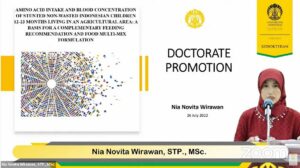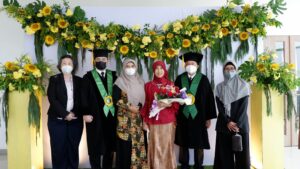
Children who are experinecing stunting have a higher susceptibility to infection as a result of their weaker immune system. They are also more likely to suffer from high blood pressure, diabetes, heart disease and obesity as adults.
Another implication is impaired academic performance due to brain and mental development at a young age. In the future, this condition will be associated with lower levels of productivity and economic income. This was conveyed by Dr. Nia Novita Wirawan, STP, M.Sc., when presenting her dissertation entitled “Amino Acid Intake and blood Concentration of Stunted Non-Wasted Indonesian Children 12-23 Months Living in an Agricultural Area: A Basis for a Complementary Feeding Recommendation and Food Multi-Mix Formulation” in the Doctoral Promotion Session, Doctor of Nutrition Science Study Program, Faculty of Medicine, on Tuesday (26/07).
In her presentation, Nia explained that stunting mostly occurs together with other indicators of malnutrition, such as wasting. Assessment of factors associated with stunting as a form of chronic malnutrition may overlap with the causes of acute malnutrition such as wasting. Therefore, comparing stunting without excluding wasting may result in exaggerated differences in the two groups.
Furthermore, in agricultural areas where food availability is considered adequate, there is a high prevalence of stunting. Sanitary hygiene and impaired absorption of nutrients including amino acids are thought to be the cause. The development of food-based interventions still leaves the challenge of meeting nutrient requirements, especially iron and zinc, but to date there has been no evidence of gaps in amino acid intake.
“The study was conducted on children aged 12-23 months in 13 villages from 2 sub-districts in Malang District, East Java. It is an agricultural region that produces vegetables, fruit, fish and milk. A total of 151 children without disease were subjected to the study. These children were born at term and normal birth weight. The study subjects consisted of 87 stunted children and 64 normal children, where children in both groups were not wasting,” said Nia.
The study found that the concentration of the amino acid arginine in the blood of stunted children was lower than that of normal children. However, there was no significant difference in the intake of macronutrients, micronutrients and amino acids between stunted and normal children. The study also found that the ratio between intake of animal and plant protein sources was higher in normal children, and the proportion of stunted children with insufficient protein intake was higher than normal children. Vitamin B1 and zinc were insufficient in the stunted group but sufficient in the normal group. In addition, the amino acid histidine was a nutritional concern for both groups.
Based on this research, Nia suggested that health workers should be aware of type II nutrients, because the lack of these nutrients can directly affect growth even though the blood levels are sufficient. Thus, access to water, sanitation and hygiene (WASH) programs includingOpen Defecate Free (ODF) areas and provision of washing facilities (hand, eating and cooking) must be accelerated to minimize fecal-oral contamination.
“The amount of protein intake alone is not enough. It is also necessary to pay attention to the quality of protein sources, especially the ratio of protein from animal and vegetable sources. In addition, local foods with high nutritional content and absorption such as cowpeas, batik beans, wader fish, and fresh cow’s milk, if made into mixed food formulations as food additives, can help meet children’s nutritional needs for macro, micro, and amino acids,” said Nia.

The doctoral promotion session was chaired by the Dean of Universitas Indonesia Faculty of Medicine , Prof. Dr. dr. Ari Fahrial Syam, Sp.PD-KGEH, MMB, with Promoter Prof. dr. Badriul Syarif Hegar, Sp.A(K), Ph.D., and Co-Promoters Dr. dr. Ina S. Timan, Sp.PK(K) and Dr. Ir. Umi Fahmida, M.Sc. The examination team was chaired by Prof. Dr. dr. Aryono Hendarto, Sp.A(K), MPH., with members of the examination team Prof. Dr. Fransisca Rungkat Zakaria, M.Sc., from Bogor Agricultural University; Dr. dr. Aria Kekalih, MTI; and Dr. Ir. Ratna C. Purwestri, M.Sc., from Czech University, Prague.



